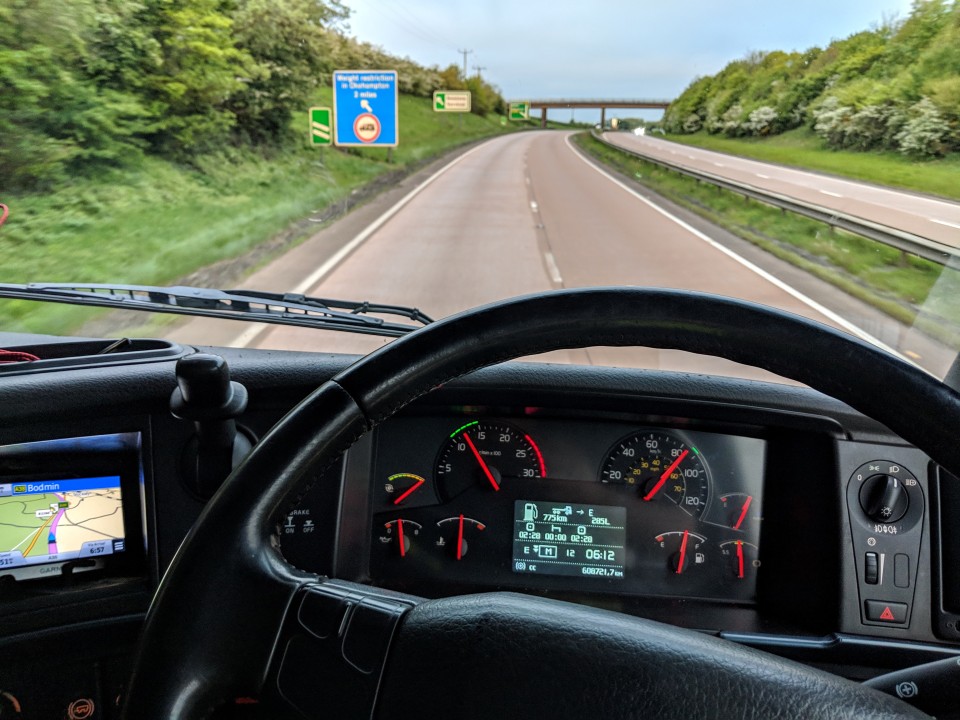
Susie Jones
Kako biti zdrav voznik tovornjaka
Ustvarjeno: 27. 08. 2024
•
Posodobljeno: 27. 08. 2024
Vožnja tovornjaka je zahteven poklic, ki pogosto vključuje dolge ure, sedeč življenjski slog in daljšo odsotnost od doma, kar lahko pogosto vpliva na zdravje številnih voznikov.
Nezdrave navade, kot so uživanje hitre hrane, pomanjkanje telesne dejavnosti in motnje spanja, lahko v prihodnosti povzročijo morebitne zdravstvene zaplete. Toda kako lahko kot voznik tovornjaka ohranite dobro telesno pripravljenost? Lažje je reči kot storiti, vendar smo pripravili seznam nasvetov, ki vam bodo pomagali, da boste na cesti v najboljši formi.
Šest najboljših nasvetov za ohranjanje zdravja na poti
1.Hydration
Preprost nasvet in dobrina, ki se nam pogosto zdi samoumevna, vendar je večina zdravstvenih težav posledica dehidracije. Redni požirki vode ali skvoša čez dan bodo izločili presnovne odpadke in toksine iz vašega sistema ter vas ohranili bolj energične in budne. Če imate pri sebi steklenico za vodo, ki jo je mogoče ponovno napolniti, vas to ne bo le opominjalo, da morate ostati hidrirani, ampak bo tudi bolj koristno za okolje.
2.Diet
Skušnjava hitre hrane po dolgem dnevu je nekaj, s čimer se lahko vsi poistovetimo, vendar ima vaša prehrana, tako kot ohranjanje hidracije, pomembno vlogo pri vašem zdravju in počutju čez dan.
Priporočljivo je, da vozniki tovornjakov jedo tri- do štirikrat na dan, in sicer dva obroka in dva prigrizka ali dva obroka in en prigrizek. Poskusite ohraniti načrt obrokov in prigrizkov, ki vsebujejo veliko omega-3, železa in vitamina C, kot so zelenolistna zelenjava, ribe in sadje. Izogibajte se pogostemu uživanju hrane in pijače, kot so testenine, kruh, sladke pijače in poživila, kot so kava in energijske pijače.
Oglejte si naš seznam zdravih prigrizkov, ki jih lahko hranite v kabini:
Granola ploščice
Energijske ploščice
Popcorn
Oreščki
Suho sadje
Temna čokolada
Poleg tega, da na potovanju kupujete zdravo hrano, je včasih bolj zdravo in stroškovno ugodno pripravljati obroke. Frieghtech ima odličen izbor receptov, ki vam bodo pomagali ohranjati zdravo prehrano med delom.
3. spanje
Voznik tovornjaka ima zaradi narave svojega dela težave z zadostno količino spanca, kar lahko povzroči katastrofalne posledice za vse udeležence v prometu.
Enostavni nasveti in triki, kot so naslednji, vam lahko pomagajo pri kakovostnem nočnem spancu:
V kabini ustvarite okolje, v katerem se boste počutili kot doma. Oglejte si našo objavo o tem, kako kabino tovornjaka spremeniti v dom
Naj bo prostor za spanje temen
Vroč tuš: Uporabite našo stran zemljevidi in ugotovite, katera postajališča za tovornjake ponujajo to možnost.
Preizkusite nekaj aplikacij za pomoč pri spanju
Poiščite idealno mesto za parkiranje brez hrupa in motenj. Naša aplikacija intruck ponuja 5 000 lokacij za težka tovorna vozila po Evropi, med katerimi lahko izbirate, medtem ko lahko naša ekipa SNAP Access and Security zagotovi varnostne rešitve po meri, ki vam omogočajo boljši spanec, saj veste, da ste vi in vaš tovornjak varni.
4.Izvajanje
Eden od najtežjih nasvetov, ki jih je treba upoštevati na poti, vendar je kljub temu pomemben. Dolge ure sedenja čez dan lahko vodijo do slabe drže, bolečin v hrbtu in morebitnih zdravstvenih zapletov. Po dolgem dnevu za volanom vas morda mika, da bi sedeli in se sprostili, vendar lahko že 15 minut hitre aktivnosti, kot sta hoja ali raztezanje, poskrbi, da se boste počutili pomlajene in manj pod stresom.
HMD Trucking je na voljo nekaj uporabnih vaj, prilagojenih voznikom tovornjakov, če želite v svojo rutino vključiti več vrst telesne vadbe.
5.Vitamini
Na poti s polnim delovnim časom je težko dobiti vse potrebne vitamine. Vsakodnevno jemanje multivitaminov lahko okrepi vaš imunski sistem in vam pomaga ohraniti zdravje.
6.Duševno zdravje
Vemo, da je skrb za telesno zdravje na cesti pomembna, toda koliko časa si vozniki tovornjakov vzamejo za skrb za duševno zdravje?

Dobrodelna organizacija za duševno zdravje Mind je objavila statistične podatke, iz katerih je razvidno, da je 30 % bolezni, povezanih z delom, ki jih prijavijo zaposleni v panogi transporta in logistike, posledica tesnobe, osamljenosti, stresa in depresije. Prav tako so namignili, da bi bila lahko ta številka višja, saj večina ljudi ne poišče pomoči, ki jo potrebujejo. Poleg tega 95 % ljudi, ki so na bolniški, ne navede pravega razloga za odsotnost z dela, če gre za njihovo duševno zdravje.
Upoštevanje zgornjih nasvetov in trikov lahko pozitivno vpliva na vaše duševno zdravje. Poleg tega je pomembno, da se z drugimi vozniki tovornjakov, nadzorniki ali dispečerji odkrito in pošteno pogovarjate.
Ali lahko z vadbo izboljšate voznika?
Zdrav življenjski slog ne prispeva le k boljšemu duševnemu zdravju, temveč tudi k boljšemu vozniškemu stanju. Študija je pokazala, da so vozniki, ki so morali vsak dan telovaditi, poročali o večji lahkotnosti pri obračanju glave, bili so sposobni daljšega obračanja telesa in hitreje so se lahko usedli v avto.
Kaj je najtežje pri delu voznika tovornjaka?
Dolge ure se zdijo eden najtežjih vidikov vožnje tovornjaka. Vozniki tovornjakov se pogosto soočajo z dolgimi prevoženimi kilometri in nesocialnimi urami. Dolgi kilometri in nesocialne ure lahko privedejo do nezdravega življenjskega sloga.

Kako nezdravo je biti voznik tovornjaka?
Zaradi življenjskega sloga številnih voznikov tovornjakov je v povprečju statistično bolj verjetno, da bodo imeli zdravstvene težave v primerjavi z ljudmi, ki opravljajo druge poklice. Vozniki tovornjakov se pogosto soočajo z nekaj ovirami, kot so tesni delovni prostori, stresne situacije, nenavaden način spanja in pomanjkanje hranljive hrane, kar vse vpliva na njihovo zdravje.
Vzdrževanje zdravega življenjskega sloga voznika tovornjaka zahteva zavesten napor, vendar so koristi, ki jih to prinaša, na splošno vredne. Z zgornjimi nasveti boste lahko prevzeli nadzor nad svojim zdravjem in izboljšali svoje počutje. Spremljajte še več nasvetov in trikov, ki vam jih ponujamo v podjetju SNAP.



